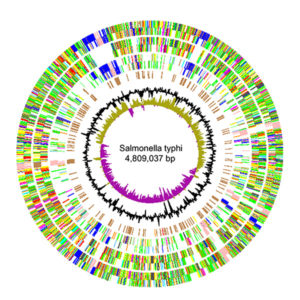Working with Pathogen Genomes (Montevideo, Uruguay)
11–16 November 2018
Institute of Hygiene, Montevideo, Uruguay
Summary
In collaboration with the Institute of Hygiene in Montevideo, Uruguay, we are pleased to announce our latest Overseas Course in Working with Pathogen Genomes.
Understanding pathogen genomes, how they evolve and which genes are essential for their ability to cause disease, is a key part
of the battle to reduce the global disease burden.
This five-day computational course aims to give molecular microbiologists working with bacterial and eukaryotic pathogens a working knowledge of genomic analysis. The course will be taught by members of the Infection Genomics teams from the Wellcome
Sanger Institute in collaboration with regional instructors and speakers, and will take the form of a series of modules covering the
fundamental aspects of DNA sequence analysis and exploitation.
Each module will be introduced with a short talk, followed by hands-on worked examples using data from bacterial and eukaryotic pathogens. A key aspect of this course is the shared interest in pathogens between instructors and participants. This common
understanding of the questions and problems presented by our work results in particularly fruitful interactions.
The course begins with training in the use of genome analysis software (Artemis and ACT), developed at the Sanger Institute for genome exploration and comparative genomics. It then goes on to cover the mapping of Illumina sequence data, SNP calling, phylogenetics, genome assembly, genome annotation and RNA-seq.
The course is aimed at research scientists or clinicians/healthcare professionals based in institutes in Latin America and the Caribbean who are actively involved in, or soon to commence, relevant research on bacterial and eukaryotic pathogens. The course is free to attend and limited bursaries are available to cover travel and accommodation expenses. All modules will be taught in English.
Reviews from previous courses
“I’d like to express my gratitude to all instructors and staffs in the course. Thank you.”
“I appreciate all instructors and coordinators who made this course fantastic”
“I am really impressed with all instructors who always promptly explained and give their best suggestions and advises, making the best training course ever for me.”
“I would like to take this opportunity to thank all the course instructors once again.”
“The best thing about this course is to get in touch with so many different people from around the world and to have such a great teaching staff!”
“I thoroughly enjoyed this course, and would like to thank all of the instructors for explaining everything so well.”
Programme
The programme will include lecture and practical computer-based sessions covering the following topics:
- Introduction to pathogen genomics
- Introduction to Artemis
- Using the Linux operating system for bioinformatics
- Comparative genomics using the Artemis Comparison Tool (ACT)
- Mapping Illumina sequence data against a reference genome
- Genome-wide phylogenetic analysis using SNPs
- Genome assembly
- Genome annotation
- Transcriptome analysis using RNA-seq data
- Two extended practical sessions applying the above topics
Learning Outcomes
After completing this course, participants should be able to:
- Understand the different file formats related to genome sequencing data
- Explore genome sequences using Artemis
- Map sequencing reads to a reference genome
- Identify genomic differences between pathogens
- Construct phylogenetic trees to understand the recent evolution of pathogens
- Produce new, annotated genome sequences
- Identify changes in pathogen gene expression
Instructors and speakers
The course will be taught by members of the Infection Genomics teams from the Wellcome Sanger Institute in collaboration with regional instructors and speakers.
How to apply
Prerequisites
Applicants should be research scientists or clinicians/healthcare professionals based in institutes in Latin America and the Caribbean who are actively involved in, or soon to commence, relevant research on bacterial and eukaryotic pathogens. The course will be taught in English.
Applications
Applications can be submitted online. Places are limited and will be awarded on merit.
If you have any problems with the online application process, please contact us.
Please note: Applications must be supported by a recommendation from a scientific or clinical sponsor (e.g. supervisor, line manager, or head of department). A request for a supporting statement will be sent to your nominated sponsor automatically during the application process. Applicants must ensure that their sponsor provides this supporting statement by the application deadline.
Applications without a supporting statement cannot be considered.
Deadline for Applications: 1 August 2018
Cost
Cost
The course is subsidised by the Wellcome Genome Campus Advanced Courses and Scientific Conferences Programme and is free to
attend for non-commercial applicants.
Please contact us for the commercial fee.
Bursaries
Limited bursaries to cover travel, accommodation and sustenance costs are available and are awarded on merit. If you would like to apply for a bursary, please complete the bursary section of the online application form.
Please note that both the applicant and sponsor are required to provide a justification for the bursary as part of the application
Bursary terms and conditions
Overseas Courses (held outside of the UK)
A limited number of bursaries are available for each course. These are awarded on merit to cover travel, accommodation and sustenance. The maximum award for travel (economy class) will be £750.
Bursaries can be applied for as part of the course application form.
Applicants will be notified of a bursary award along with their place on the course, usually within one month of the application deadline. The decision of the selection committee is final.

